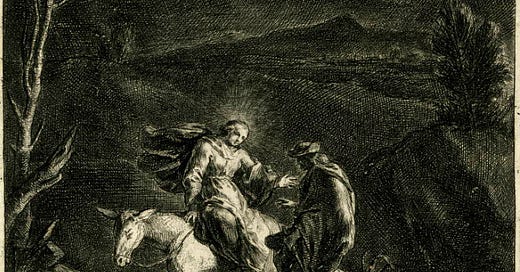Image: La Vierge et Saint Joseph vont de Galilee a Bethleem, Joseph Parrocel, 17th-18th Century
Human suffering is hard enough, but it’s even harder when it just doesn’t make sense. In our minds, we turn over situations, weigh, measure and calculate, trying to find some reason, explanation or purpose. As rational beings, we desire to understand the pain we endure, as if this understanding will on some level, take the edge off, or better yet justify, the pain. If we can understand it, maybe we can avoid suffering in the future, protect ourselves better in the present, and rationalize the bewildering challenges of our past.
This year, throughout the Advent and Christmas season, I am struck by the amount of times that Mary and Joseph were faced with sufferings and callings that didn't make sense. Mary would be with child as a virgin by the Holy Spirit. Later, she would have to give birth to the Lord of the Universe in a cave. (Forget a perfect birth plan, tranquil and safe environment and controlled setting!) And of all times, Joseph was required to get himself and his expectant wife to Bethlehem for government paperwork (so relatable) when Mary was very advanced in her pregnancy. Then, after Christ’s birth, Joseph was told in a dream to leave for Egypt in the middle of the night. At the presentation, Mary was warned that “a sword shall pierce your heart.” The story of the birth of Jesus, and subsequently, his life, is a story of Mary and Joseph being handed, or invited, to walk through one confusing suffering and trial after the next. I wonder how much they turned over these confounding invitations and commands in their heads, ringing out their bewilderment like a soaking rag. Perhaps they did, a little, but the scriptures show us that while Mary “pondered all these things in her heart”; both Mary and Joseph accepted, obeyed, and acted. They didn't require of God a reason, a thorough explanation, or a long range plan before they stepped into obedience and trusted. The Holy Family found their peace and protection by responding fully to the present moment regardless of how painful and confusing it was.
Kimberly Shankman discusses the profundity of the Holy Family’s trust in today’s Magnificat meditation:
“The glimpses we get of the life of the Holy Family show us the immense trust that Mary and Joseph had in God’s loving providence. We know what was going to happen to them; they didn’t. This makes their trust even more astonishing.”
It is easy to waste an incredible amount of time searching for reasons, explanations, and redeeming endings that will reward our endurance of current trials. We can get stuck in a ruminating loop. I know I certainly can. Many times, we are not granted explanations in the moment. Senseless suffering can make pain all the more painful. So does feeling like this suffering could have been avoidable if we had made or a better or different choice. Fr. Jacques Philippe writes to this phenomena of endless questioning and seeking to make sense of our suffering and God’s mysterious plans:
“It’s right and necessary to ask questions, but sometimes we should also ask ourselves what our questions really mean! In this life it is sometimes absolutely necessary that we consent to go forward without understanding.”
What is harder for us to grasp is that God’s plan is “higher than the heavens” above our own understanding, and many times our own redemption stories include detours, interruptions, sudden instructions, and difficult to grasp plot twists. But God didn't ask Mary and Joseph to understand their big life picture: He asked of them one step at a time. In some instances, quite literally. He certainly doesn't always provide us with the “why” when He is inviting us forward or asking something difficult or confusing of us.
I wonder what Mary was thinking as she held the Savior of the universe, the tiny newborn babe, in her arms, in a stable in Bethlehem. Maybe his tiny hands curled a golden piece of straw that formed his bed. Did she tenderly pull the straw from his fingers? Was she thinking, “Why here? Why now? Why me? What next?”
And what about when she held the body of her lifeless Son, crucified, on Calvary. Did she think, “My God, there must be some cosmic mistake in the plan?”
Being human, I expect that her heart certainly had questions, emotions, and pleadings to all the things that didn’t make sense.
Ultimately though, she didn’t need to hold the answers. Because she held her God.
When we grasp for answers to life’s bewildering sufferings, may we open our arms not to simply receive God’s answers and His explanations, but to receive something much greater. God himself.
Image: The Holy Night, 1652, Carlo Maratta





Such a helpful reflection. I remember when it struck me the first time that Mary and Joseph didn’t have the Bible like we do to know the whole story, and how that made me love her even more. She, like me, often had no idea what was going to happen or how it would work out. Her faithfulness regardless helps me stay strong in moments of weakness.